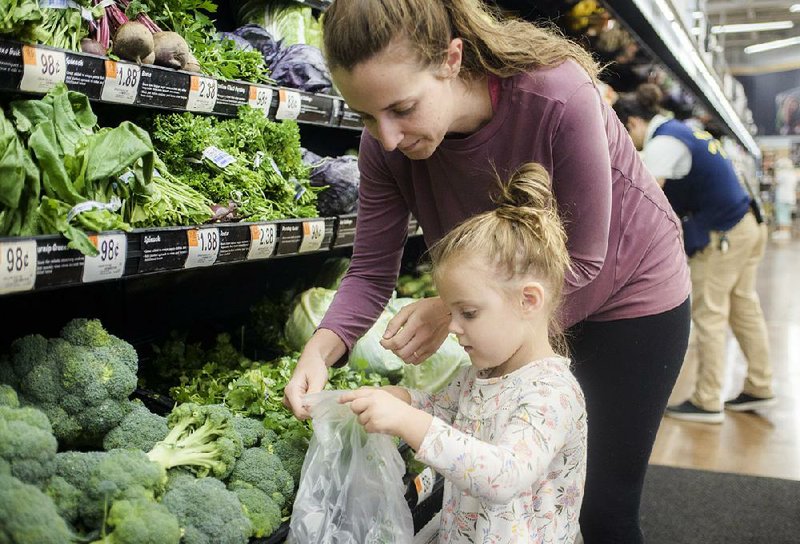Walmart Inc.'s new requirement that some suppliers use a blockchain ledger to track food from farm to table is just the latest example of the retailer's leadership in innovation, a supply chain expert says.
The Bentonville retailer told its suppliers of leafy green produce last week that they must begin by September 2019 to enter tracking information for their products into IBM's Food Trust network. The blockchain-enabled technology will radically speed the process of identifying the source of any outbreak of food-related illness.
A letter addressed to "fresh leafy greens suppliers" dated Sept. 24 outlined the basic elements of Walmart's Food Traceability Initiative. Citing a multistate outbreak earlier this year of illnesses related to Arizona-grown romaine lettuce contaminated with E. coli, the letter from Walmart U.S. food executives states food safety is a shared responsibility achieved through collaboration with suppliers.
Walmart is "taking a big leadership step here, and to do that, they're requiring their supply chain partners to participate," said John Kent, director of the University of Arkansas' Supply Chain Research Center. "Without willing participants in the supply chain, this initiative will not work."
Kent likened Walmart to a good football coach, saying the company comes up with new ideas and then implements them. "They don't just talk about them," he said.
Eventually the entire retail supply chain will use blockchain tracking technology, Kent said, but ensuring food safety is an obvious place to start.
PILOT PROGRAM
Blockchain is a digitized, decentralized, public ledger originally developed to record transactions made with the virtual currency bitcoin, according to Investopedia. Documents entered into the system are the blocks, which grow into a chain as new information is added. The technology is now being applied in numerous commercial applications, including retail.
Because the information entered into the chain is available for everyone in the network to see, blockchain is considered a transparent system of recordkeeping. A Walmart news release notes this transparency makes it extremely difficult to falsify information. Any attempt to change or alter records is clearly evident.
Another advantage of blockchain is the speed with which information can be processed. With the traditional ledger system used by most farms, tracking a product's origin can take up to a week, said Frank Yiannis, vice president of food safety and health for Walmart and Sam's Club.
Considering the path a product takes from the farm to a processing center to a warehouse and eventually to the store, "The food system is absolutely too large for any single entity to [track]," Yiannis said. With blockchain, however, it takes seconds.
The letter to suppliers states that Walmart and IBM worked on the Food Trust network, in collaboration with numerous suppliers including Dole Food Co. and Nestle SA, over the past 18 months. After testing it with a variety of products, including pork, the retailer decided the system was ready and that, in light of recent outbreaks of illness related to leafy greens, that was the best commodity to start with.
Other food categories will eventually be added to the network "in a prioritized, phased manner," according to a Walmart document on the initiative. And while the initial rollout affects only U.S. suppliers, similar programs eventually will be implemented in Walmart's international markets.
EXPLORING BLOCKCHAIN
The Food Traceability Initiative isn't the only use of blockchain Walmart has been exploring. The retailer has filed a number of blockchain-based patent applications, many of which are clearly intended for use in e-commerce.
One filed earlier this year is for a vendor payment system that automates package tracking and payment processing on grocery orders requiring same-day delivery. A related patent is for a courier shopping system to be used in processing orders and shipping them to customers.
Another patent application, dated June 5, entails "locker docking stations" to ensure online orders are delivered safely. The application states these could placed "at a user's home, at public locations such as transportation hubs, public venues ... or other desired locations."
Even more recently, a patent application published Aug. 30, titled "Systems, Devices, and Methods for In-Field Authenticating of Autonomous Robots," describes a blockchain-based system enabling delivery drones to communicate with one another and even transfer packages.
Just because a concept is patented doesn't necessarily mean it will ever be put to real-world use. However, these blockchain patents hint at huge changes ahead for logistics.
A recent report by Grand View Research states the global market for blockchain technology is expected to reach $7.59 billion by 2024. Besides retail, the report states, blockchain has potential in the financial, health care, media, telecom, transportation and public sectors.
SundayMonday Business on 09/30/2018
